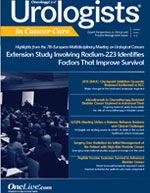Publication
Article
Oncology Live Urologists in Cancer Care®
Prevalence of DNA Repair Defects Key to Efficacy of PARP Inhibitors in Prostate Cancer
Author(s):
Clinical studies suggest that PARP inhibitors are highly efficacious in patients with metastatic castration-resistant prostate cancer with these alternations in DNA repair genes.
Felix Feng, MD
It is estimated that 20% to 30% of metastatic castration-resistant prostate cancers harbor alterations in DNA repair genes. These genes code for proteins whose normal function is to correct errors that arise when cells duplicate their DNA prior to cell division. Alterations in DNA repair genes can lead to a failure in repair, which in turn allows subsequent mutations to accumulate. Clinical studies suggest that PARP inhibitors are highly efficacious in patients with these alternations, based on findings by Robinson, et al. Studies of PARP inhibitors in other cancers, such as breast and ovarian, also support their use in patients with this alteration.1
“One could argue that PARP inhibitors should be considered as a standard of care in therapy for this subgroup of prostate cancer patients,” said Felix Feng, MD, assistant professor of Radiation Oncology, University of Michigan Health System during the 2015 Society of Urologic Oncology meeting.
PARP inhibitors are members of the poly (ADP-ribose) polymerase family of enzymes that have the repair of damaged DNA as one of their key functions. Cells have a number of different mechanisms that allow them to repair damaged DNA, including base excision repair (BER) and homologous recombination.
PARP inhibitors have a particularly critical role in the BER pathway, binding to single-strand breaks in DNA and ultimately leading to the recruitment of DNA repair proteins to the sites of damage.
PARP inhibitors block the activity of the PARP enzymes. As monotherapy, they have proven to be most effective against tumors with mutations in BRCA1/2, tumor suppressor genes whose best-understood role is the repair of double-strand breaks in DNA.
Robinson and colleagues found that 90% of cases harbored some kind of genetic anomaly that was clinically actionable, meaning there may be potential treatments to target that specific aberration. This suggests that clinical genomic sequencing could impact treatment decisions in a significant number of patients with disease. Previous studies have looked at the genomic landscape of clinically localized prostate cancer and found few actionable genomic alterations.
The researchers found that nearly all the tumors had a genetic aberration known to drive cancers. The most common, found in nearly two-thirds of the patients, were aberrations in the androgen receptor. This was expected to some extent since the hallmark of castration-resistant disease is that it no longer responds to conventional androgen-blocking therapies. However, many other aberrations were found, as well.
Fourteen percent of patients had a mutation in the BRCA1 or BRCA2 gene, which are already known to increase risk of breast and ovarian cancer. PARP inhibitors have already been approved in BRCA-positive ovarian cancer, suggesting potential for PARP inhibitors to play a role in prostate cancers with this type of aberration. In March 2015, Feng reviewed all the clinical trials involving PARP inhibitors in cancer and found 149 studies, but only 3 involved prostate cancer. By the time of the SUO meeting in December, that number had risen to 6. The defining trial of PARP inhibitors in prostate cancer was recently published by Johann De Bono,2 involving single-agent olaparib in patients with metastatic castrate resistant prostate cancer (mCRPC).
Feng, a co-investigator in the De Bono study, said that the open-label, single-group, two-stage, multicenter phase II TOPARP-A trial examined olaparib in 50 patients with mCRPC whose disease had progressed following 1 or 2 chemotherapy regimens. Patients had an ECOG performance status of 0 to 2 and all had received prior docetaxel. Ninety-eight percent (n = 49) of patients received prior abiraterone acetate (Zytiga) or enzalutamide (Xtandi), and 58% (n = 29) had received cabazitaxel (Jevtana).
“DNA repair defects predict response to olaparib,” stated Feng. Approximately 33% of patients responded to olaparib and those responders had a mean duration of response of about 9 months. DNA repair defects were identified in 16 of 49 patients. Among the 16, 88% had a response. Out of the 33 patients who did not exhibit a DNA repair alteration, only 2 responded.
Feng also pointed out that PARP inhibitors have functions beyond DNA repair, namely as a regulator or modulator of transcription in the androgen receptor (AR). PARP-1 promotes oncogenic phenotypes in preclinical models of prostate cancer. Moreover, in models of advanced prostate cancer, PARP-1 enzymatic activity is enhanced, further linking PARP-1 to AR activity and disease progression.3
The role of PARP inhibitors in prostate cancer remains to be determined, but these findings suggest a viable treatment option for these patients.
“I think there’s still a lot of questions to work out,” said Feng. These questions include what sequence or order should PARP inhibitors be administered in the course of disease progression, what combination of therapies results in the best outcome, and which biomarkers may be best predictive for response. “But nevertheless, I think that somewhere along the course of treatment for a patient with a DNA repair defect, PARP inhibitors should be strongly considered.”
References
- Robinson D, Van Allen EM, Wu YM, et al. Integrative clinical genomics of advanced prostate cancer. Cell. 2015;161(5):1215-1228.
- Mateo J, Carreira S, Sandhu S, et al. DNA-repair defects and olaparib in metastatic prostate cancer. N Eng J Med. 2015;373:1697-1708.
- Schiewer MJ, Goodwin JF, Han S, et al. Dual roles of PARP-1 promote cancer growth and progression. Cancer Discov. 2012;2(12):1134-1149.










